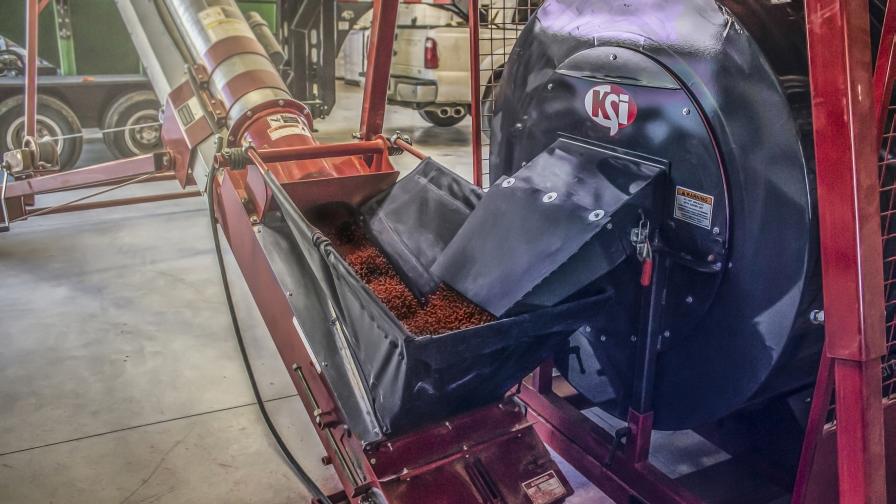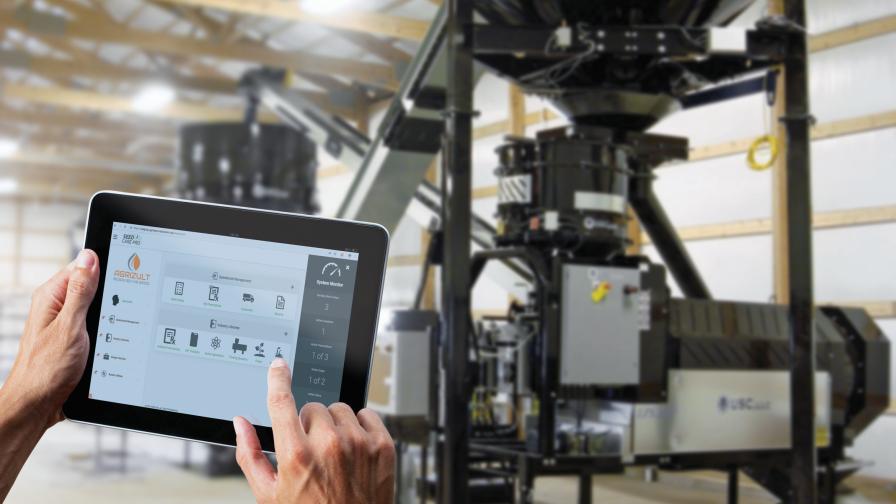Seed Care Equipment Revolves Around Accuracy, Transparency
Accuracy and transparency are two factors of seed care equipment that every ag retailer should consider, according to a trio of manufacturers.
“Accuracy matters,” according to USC Owner/CEO Andy Renyer, and the automation that is offered with today’s treaters can provide accuracy within 1%, he adds. “I don’t think a lot of growers or retailers are aware of that. When you are treating with three or four different chemistries at a time, accuracy is hugely important,” Renyer says.

The KSi 4808NGA Seed Applicator features patented technology and design elements focused on accurate initial chemical application and a progressive seed conditioning and polishing process that results in uniform seed coverage, reduced stickiness, and marketable appearance with reliable plant-ability.
Rick Smith, Director of Marketing with KSi, encourages his company’s ag retail customers to be transparent with their seed treatment operations. “When growers have visibility into the process and information about the product they receive, it builds trust. Many growers are not accustomed to asking these questions, but at a time when margins are tight, this sort of transparency is more critical than ever,” Smith says.
That competitive landscape demands that every job be done correctly to guarantee the best chance for economic return, Jeff Ochampaugh, President of Agrilead, says. “Performance and correctness — service providers with precision seed treating and information management systems will be most capable of delivering impactful value for their business and the customers they serve.”
Growers, Ochampaugh adds, should ask their seed care service providers to show them a breakdown of the proposed treatment plans for their seed, including the active ingredients, rates of active delivered per seed, the purposes of the active, and how the service providers accomplish the applications so that the growers can understand the value and expected performance of the seed treatment packages being suggested. In turn, ag retailers should consider and design their treatment plan offerings with these grower questions in mind and empower their teams with the precision seed treating equipment and information management systems needed to correctly execute and deliver intentional performance, Ochampaugh says.
Looking Ahead
Many ag retailers are working with outdated seed treating equipment, Smith says, and, without automation, these systems are often difficult to operate and do not have the technology for data verification of how accurate or inaccurate treatment was applied. KSi, he says, is helping its customers improve their systems through the addition of automation. “With control software in place, they can more efficiently operate the system and produce more accurate application rates. Further, they now have the data management technology in place to show what has actually been applied and how accurately, resulting in more transparency to the grower and more accountability for the operator,” he says.
Ochampaugh foresees the continued emergence of new seed-applied technologies, such as biologicals, nutritionals, and dry seed finishers, which will require new equipment accommodations for sequentially applied liquid and dry products, he says.
Efficient and affordable seed care equipment will be “extremely important” in 2020, Renyer says. “Organizations need to be running at peak efficiency with the ability to do more with less,” he says.
Company News
Agrilead this year completed beta-testing of its Seed Care Pro line, which will be commercially available for the 2020 growing season. The cloud-based precision seed care platform is designed to empower service providers with the tools and workflows needed to manage seed treatment planning and precision application. “While Seed Care Pro is not a piece of equipment, it is designed to ultimately deliver the treatment application instructions needed to execute the complex treatment plans of the modern seed care era,” Ochampaugh says.
KSi evaluated its product line while focusing on its long-term vision and relationships. “For many of our customers, that meant choosing small equipment purchases that make the biggest improvement to their existing systems, such as dry additive feeders for addition of powders and flowability agents, seed filtration and dust extraction systems for cleaner seed and environmental conditions, and software upgrades for better accuracy and data management,” Smith says.
USC launched its LPX Lite treater early in 2019. “It brings a high level of accuracy and a robust set of features at about half the price of other brands,” Renyer says. “It will be a great treater for the current market conditions. You can upgrade without getting tangled up in long-term contracts and have one of the most capable and easiest-to-use treaters on the market.”







